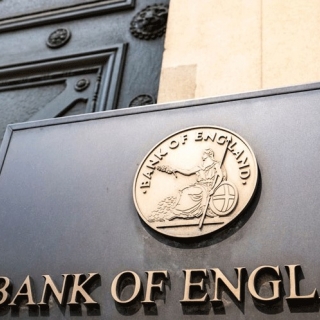


The Bank of England kept its key interest rate on hold at 4.25% during its Thursday meeting, with economists expecting the central bank to wait until August before it cuts again.
Six out of nine of the BOE's monetary policy committee opted to hold rates with three opting for a 25-basis-points cut.
"Underlying UK GDP [gross domestic product] growth appears to have remained weak, and the labour market has continued to loosen, leading to clearer signs that a margin of slack has opened up over time," the central bank said in a statement.
"Measures of pay growth have continued to moderate and, as in May, the Committee expects a significant slowing over the rest of the year," it said, adding that the MPC "remains vigilant about the extent to which easing pay pressures will feed through to consumer price inflation."
The policymakers' decision to hold rates comes after the latest data out Wednesday showed the U.K.'s annual inflation rate reached 3.4% in May, meeting analyst expectations but lingering far above the bank's target of 2%.
Earlier this year, the Bank of England said that it expects inflation to rise to 3.7% in the third quarter, before starting to cool into next year. It nevertheless still doesn't know the outcome of U.S. President Donald Trump's global tariffs policy, and with conflict erupting in Middle East, inflationary pressures could rise.
Those pressures, coupled with lackluster U.K. growth after a 0.3% economic contraction in April, put the central bank in a difficult position on whether — and when — to cut rates.
"The bank last month divided 5 [MPC members] to 4 over the decision to cut rates a little, and the majority were very much seeing the economy slowing down and the threat of a faster slow down if tariffs and other U.S. policy seep through the economy, so that is the worry," John Gieve, former deputy governor of the Bank of England, told CNBC on Wednesday.
"The question was, ‘Should we cut now or wait a little bit?' That was the way they were looking at it [then]," he added.
"The Middle East conflict complicates things further. Firstly, it could have an effect on oil prices which could push inflation up even further ... and, secondly, it could be disruptive to the world economy and to trade, which again would be a downward pressure on our growth, so that's precisely where the bank is right now," he told CNBC's "Squawk Box Europe."
Economists polled by Reuters widely expect BOE policymakers to cut rates by 25 basis points (bps) at the next gathering in August, and to make a trim of another 25 bps in the fourth quarter.
Grieve said the confluence of external, uncontrollable and potentially inflationary pressures — along with the domestic outlook for growth, taxation and spending — made it hard to predict the BOE's strategy.
"What the bank and markets are expecting is that interest rates will edge down to 4% or perhaps a little bit lower the rest of the year unless there's a really big development on the world stage, but we don't know how this conflict in the Middle East will play out, and we don't know how tariffs ... are going to play out. So [Bank of England policymakers] are going to have watch things month by month," Grieve said.
Source : CNBC
Stephen Miran, a Federal Reserve governor whose term ends at the end of January, said Thursday that he is looking for 150 basis points of interest-rate cuts this year to boost the U.S. labor market. ...
Federal Reserve Vice Chair for Supervision Michelle Bowman outlined significant changes to bank supervision and regulation during a speech at the California Bankers Association Bank Presidents Seminar...
Further changes to the Federal Reserve's short-term interest rate will need to be "finely tuned" to incoming data given the risks to both the U.S. central bank's employment and inflation goals, Richmo...
Richmond Federal Reserve Bank President Tom Barkin said the monetary policy outlook remains in a fragile balance given the conflicting pressures of rising unemployment and persistently high inflation....
The US Federal Reserve agreed to cut interest rates at its December meeting only after a highly nuanced debate about the current risks facing the US economy, according to minutes from the two-day meet...
Oil prices stabilized on Thursday (February 12th), as the market reassigned a risk premium to US-Iran tensions despite US inventory data showing swelling domestic supplies. This movement confirms one thing: geopolitical headlines are still more...
Gold prices weakened slightly on Thursday (February 12th), as more solid US employment data reduced market confidence in an imminent Federal Reserve interest rate cut. The strong employment data prompted market participants to shift expectations of...
The Hang Seng Index reversed its downward trend in Hong Kong on Thursday (February 12th), weakening by around 0.9% to around 27,000 after a strong session earlier. This decline halted the momentum of the short term rally, as investors began to...